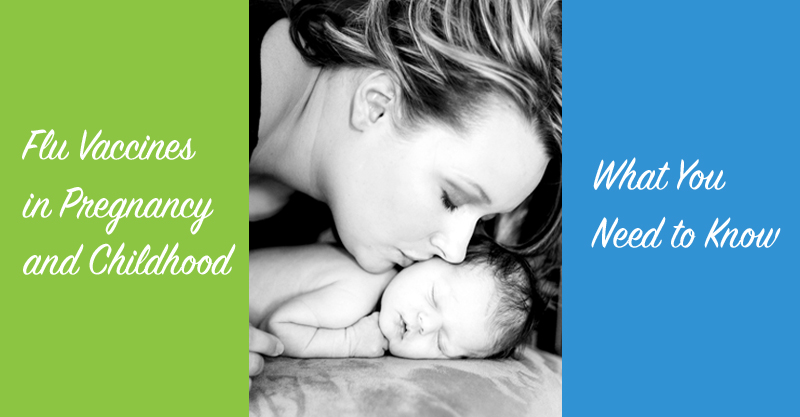
Flu Vaccines in Pregnancy and Childhood: What You Need to Know
by The World Mercury Project Team
You want to do everything right for your child, and would never knowingly allow someone to inject a neurotoxin into your infant. Before getting a flu shot, you need to know this: MERCURY is a NEUROTOXIN.
What You Need to Know
The Food and Drug Administration (FDA) warns pregnant women and young children not to eat fish containing high levels of methylmercury. Yet the Centers for Disease Control and Prevention (CDC) recommends pregnant women and infants get influenza vaccines, many of which contain ethylmercury from the preservative thimerosal. Receiving them may result in mercury exposures exceeding the Environmental Protection Agency (EPA) recommended maximum levels.
World Mercury Project is deeply concerned that the risks of getting mercury-containing seasonal influenza vaccines may outweigh the benefits for pregnant women, infants and children. Mercury is known to be highly toxic to brain tissue and can impact critical stages of brain development.
A 2017 CDC study links miscarriage to flu vaccines, particularly in the first trimester. Pregnant women vaccinated in the 2010/2011 and 2011/2012 flu seasons had two times greater odds of having a miscarriage within 28 days of receiving the vaccine. In women who had received the H1N1 vaccine in the previous flu season, the odds of having a miscarriage within 28 days were 7.7 times greater than in women who did not receive a flu shot during their pregnancy.
A study published in 2016 that looked at the safety of flu vaccines found a moderately elevated risk for major birth defects in infants born to women who had received a flu vaccine during the first trimester of pregnancy. A study published in 2017 found an elevated risk of autism spectrum disorders in children whose mothers had a first trimester flu shot.
Flu vaccine administration is documented to cause an inflammatory response in pregnant women. Recent research found inflammation during pregnancy is associated with the development of autism spectrum disorders.
A large study in approximately 50,000 pregnant women over five flu seasons found no difference in the risk for developing influenza or similar illnesses between those who received the influenza vaccine during pregnancy and those who did not.
An independent 2014 review found no randomized controlled trials assessing vaccination in pregnant women. It states, “The only evidence available comes from observational studies with modest methodological quality. On this basis, vaccination shows very limited effects.”
Know the Facts
In 2004, the Environmental Protection Agency (EPA) estimated that one in every six women has mercury blood levels that could pose a risk to an unborn child.
- Mercury rapidly crosses the placenta and accumulates in the fetus at higher levels than in the mother. Two studies in 2012 showed that a mother’s mercury exposure is linked to attention problems in her children.
- Scientific studies have documented that ethylmercury used in vaccines crosses into the infant brain and could impact critical stages of brain development.
- It is inconsistent to recommend vaccines containing ethylmercury when also counseling pregnant women to avoid seafood high in methylmercury due to the known harmful effects mercury can have on the developing fetus.
- Thimerosal-containing flu vaccines contain 250 times the mercury level the EPA uses to classify hazardous waste. Unused thimerosal-containing flu vaccine should be returned to the manufacturer for appropriate disposal.
2017-2018 Flu Vaccines
TABLE 1. Influenza vaccines — United States, 2017–18 influenza season*
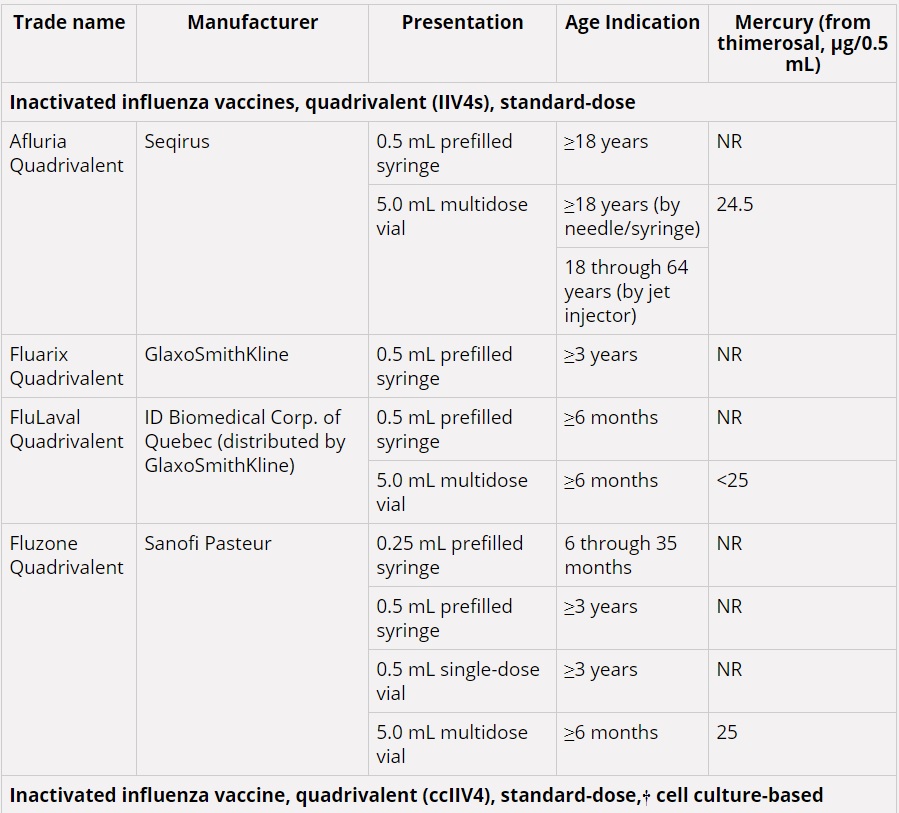
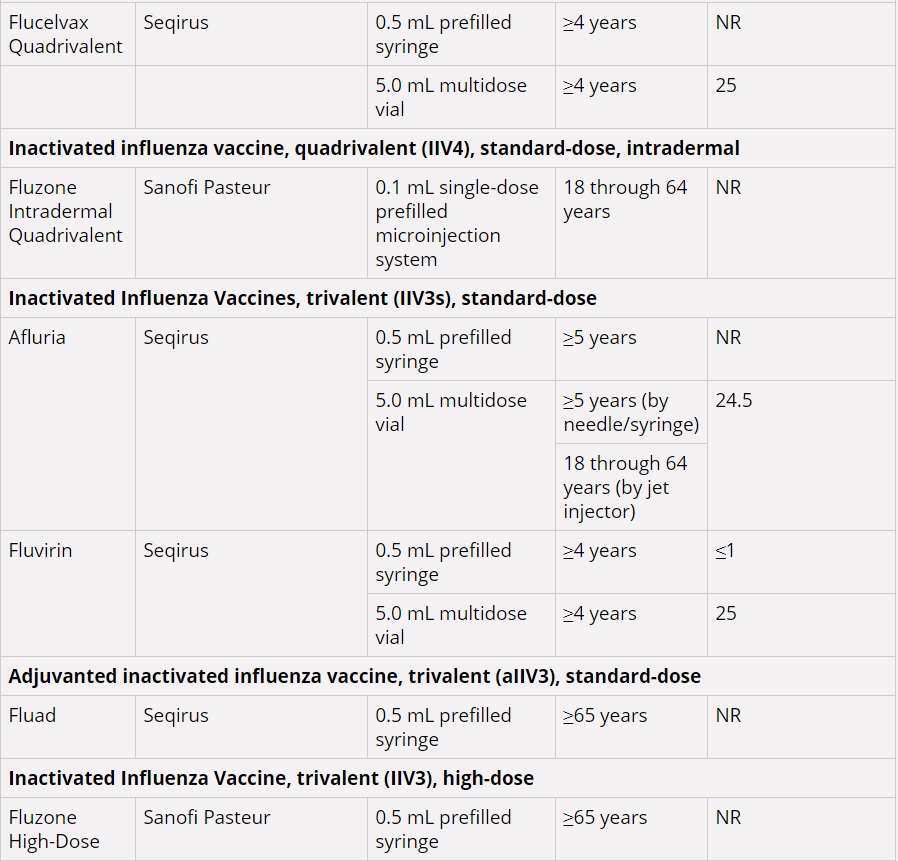

*NR = not relevant (does not contain thimerosal).
If You Are Pregnant or Have Small Children . . .
- If you decide to vaccinate, insist on mercury–free influenza vaccines for yourself and your children and do not get a flu vaccine the same day as other vaccines.
- Do not let yourself be pressured into receiving a vaccine that you don’t want; should you choose to vaccinate, insist that your doctor or pharmacist find you a mercury-free vaccine.
- If mercury-free vaccines are unavailable, look at the evidence and decide if the influenza virus is a significant concern for your family.
- Also, consider the evidence regarding the effectiveness of the flu vaccine in actually preventing influenza. For information visit www.summaries.cochrane.org
More Vaccine Facts to Know…
All vaccines, with or without mercury, pose health risks. However, the influenza vaccine is of great concern, as many brands contain high levels of mercury in their multi-dose vials. Be sure to read package inserts for any vaccine prior to getting vaccinated.
According to flu vaccine package inserts,
Safety and effectiveness has not been established in pregnant women or nursing mothers and should only be given to a pregnant woman if clearly needed.
A study that compared children who received flu vaccine to those who did not found no significant difference in the rate of influenza between the active and placebo groups. It also found that the group of children who received the flu vaccine had a 4.4 times relative risk of non-influenza respiratory tract infections.
An Australian study found one in every 110 children under the age of 5 had convulsions following vaccination with the FLUVAX H1N1 vaccine in 2009. Additional research found a spike in cases of narcolepsy in children associated with the H1N1 vaccine.
A review in the medical journal The Lancet found a lack of health benefits from influenza vaccine in children under two along with significantly increased rates of vaccine-related adverse events.
Tips for Preventing the Flu
Simple techniques such as avoiding those with flu-like illnesses, eating a healthy diet and good hand washing can prevent many cases of flu. If you do contract influenza, optimizing vitamin D levels, fluid intake and rest can boost immune function.
For complete list of references, articles on flu vaccines and more, please visit our website at www.worldmercuryproject.org/flufacts
Download and print our flu vaccine brochure. Share with your family, friends, doctors and community leaders.
Visit our flu vaccine web page. It’s full of flu facts to help you make informed decisions about your family’s healthcare.
Read the full article on WorldMercuryProject.org or on their Facebook page here.
Leaving a lucrative career as a nephrologist (kidney doctor), Dr. Suzanne Humphries is now free to actually help cure people.
In this autobiography she explains why good doctors are constrained within the current corrupt medical system from practicing real, ethical medicine.
One of the sane voices when it comes to examining the science behind modern-day vaccines, no pro-vaccine extremist doctors have ever dared to debate her in public.
Medical Doctors Opposed to Forced Vaccinations – Should Their Views be Silenced?
One of the biggest myths being propagated in the compliant mainstream media today is that doctors are either pro-vaccine or anti-vaccine, and that the anti-vaccine doctors are all “quacks.”
However, nothing could be further from the truth in the vaccine debate. Doctors are not unified at all on their positions regarding “the science” of vaccines, nor are they unified in the position of removing informed consent to a medical procedure like vaccines.
The two most extreme positions are those doctors who are 100% against vaccines and do not administer them at all, and those doctors that believe that ALL vaccines are safe and effective for ALL people, ALL the time, by force if necessary.
Very few doctors fall into either of these two extremist positions, and yet it is the extreme pro-vaccine position that is presented by the U.S. Government and mainstream media as being the dominant position of the medical field.
In between these two extreme views, however, is where the vast majority of doctors practicing today would probably categorize their position. Many doctors who consider themselves “pro-vaccine,” for example, do not believe that every single vaccine is appropriate for every single individual.
Many doctors recommend a “delayed” vaccine schedule for some patients, and not always the recommended one-size-fits-all CDC childhood schedule. Other doctors choose to recommend vaccines based on the actual science and merit of each vaccine, recommending some, while determining that others are not worth the risk for children, such as the suspect seasonal flu shot.
These doctors who do not hold extreme positions would be opposed to government-mandated vaccinations and the removal of all parental exemptions.
In this article, I am going to summarize the many doctors today who do not take the most extremist pro-vaccine position, which is probably not held by very many doctors at all, in spite of what the pharmaceutical industry, the federal government, and the mainstream media would like the public to believe.






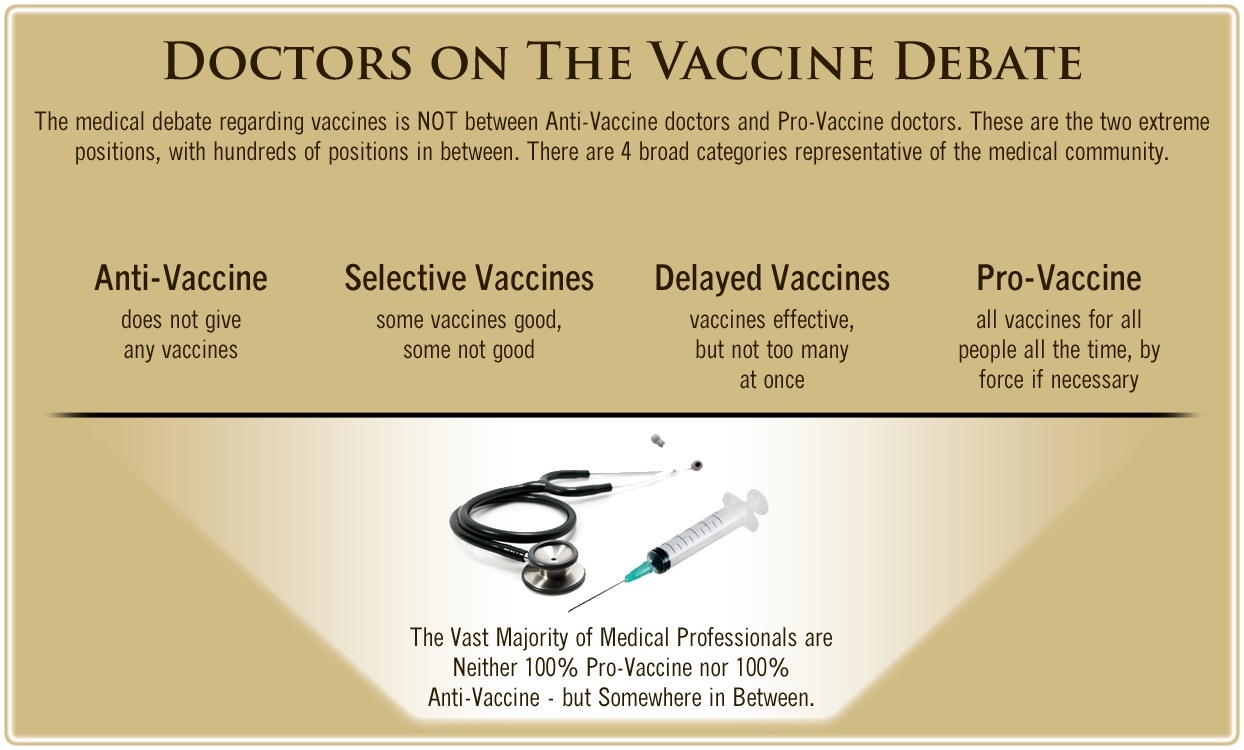
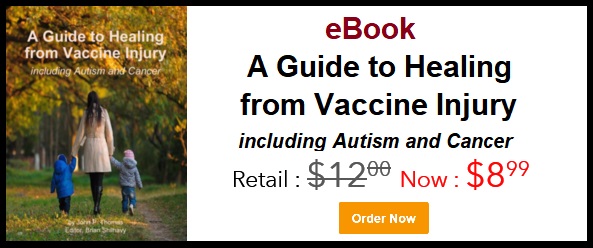
Leave a Reply